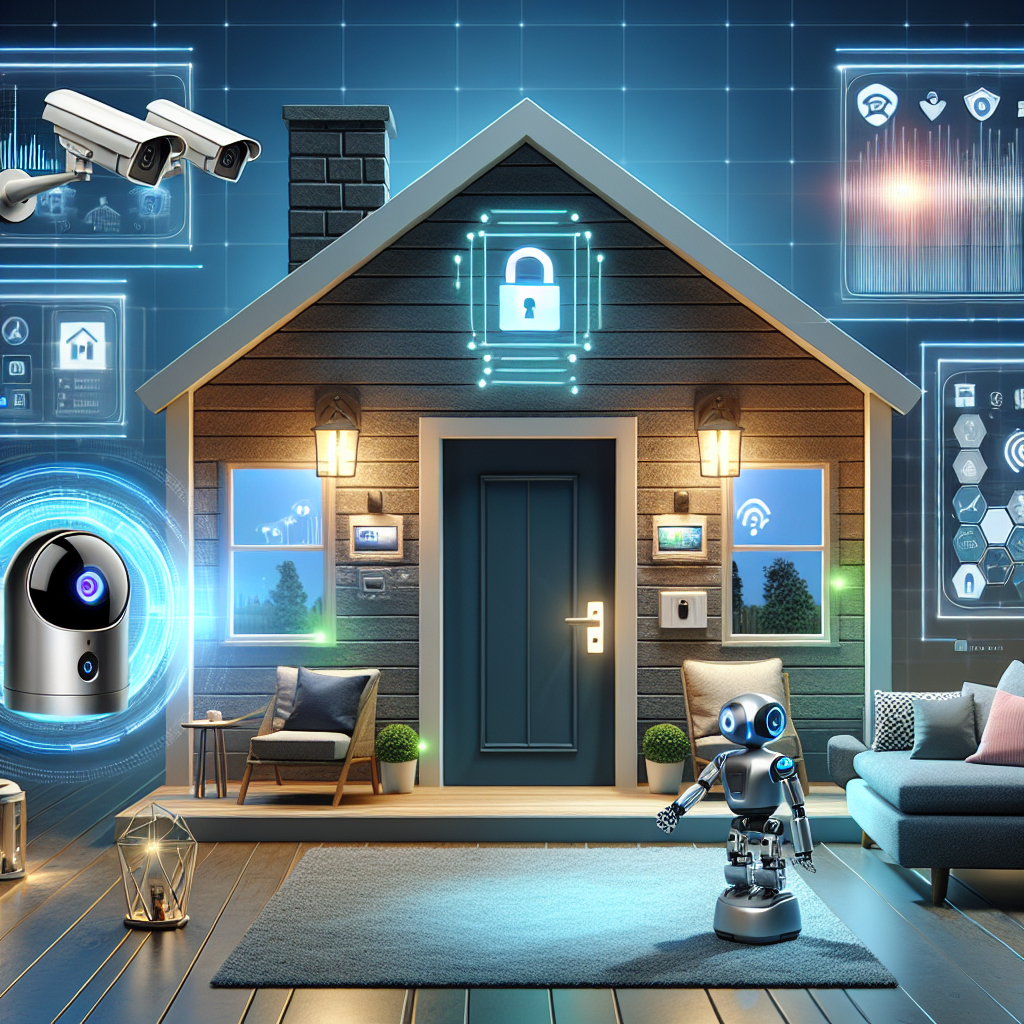In recent years, the use of artificial intelligence (AI) tools for improving home security has become increasingly popular. These tools use advanced algorithms and machine learning to enhance the security of homes, making them more efficient and effective at detecting and preventing intrusions. From smart cameras to facial recognition technology, AI tools are revolutionizing the way we protect our homes. In this article, we will explore some of the most popular AI tools for improving home security and discuss their benefits and potential drawbacks.
1. Smart Cameras: One of the most common AI tools used for home security is smart cameras. These cameras are equipped with advanced features such as motion detection, facial recognition, and night vision capabilities. They can be connected to a smartphone or other smart devices, allowing homeowners to monitor their property from anywhere in the world. Smart cameras can send alerts to homeowners when they detect suspicious activity, allowing them to take action immediately. Some smart cameras also have two-way audio capabilities, allowing homeowners to communicate with visitors or intruders remotely.
2. Facial Recognition Technology: Facial recognition technology is another AI tool that is being used to improve home security. This technology can be integrated into smart doorbells or security cameras to identify individuals entering or leaving a property. Homeowners can create a database of approved faces, and the system will send alerts if an unrecognized person is detected. Facial recognition technology can also be used to unlock doors or gates, providing an additional layer of security for homeowners.
3. AI-Powered Intrusion Detection Systems: AI-powered intrusion detection systems use machine learning algorithms to analyze patterns of behavior and identify potential threats. These systems can detect unusual activities, such as someone trying to break into a window or door, and send alerts to homeowners or authorities. AI-powered intrusion detection systems can also learn from past incidents and adapt their algorithms to improve accuracy over time.
4. Virtual Assistants: Virtual assistants such as Amazon Alexa or Google Assistant can also be used to enhance home security. These virtual assistants can be integrated with smart home devices, allowing homeowners to control their security systems with voice commands. For example, homeowners can arm or disarm their alarm systems, lock or unlock doors, or adjust lighting settings using voice commands. Virtual assistants can also provide real-time updates on the status of security devices and alert homeowners to any potential security threats.
Benefits of AI Tools for Improving Home Security:
1. Enhanced Detection Capabilities: AI tools can analyze vast amounts of data in real-time, allowing them to detect potential threats more quickly and accurately than traditional security systems. This can help homeowners identify and respond to security incidents before they escalate.
2. Remote Monitoring: AI tools enable homeowners to monitor their property from anywhere in the world using a smartphone or other smart devices. This gives homeowners peace of mind knowing that they can check on their home at any time, even when they are away on vacation or at work.
3. Customization: AI tools can be customized to meet the specific needs and preferences of homeowners. Whether you want to focus on monitoring the perimeter of your property, securing specific entry points, or monitoring specific areas of your home, AI tools can be tailored to your requirements.
4. Increased Deterrence: The presence of AI-powered security devices, such as smart cameras or facial recognition technology, can act as a deterrent to potential intruders. Criminals are less likely to target homes that have visible security systems in place, reducing the risk of break-ins or theft.
Drawbacks of AI Tools for Improving Home Security:
1. Privacy Concerns: AI tools that use facial recognition technology or monitor activity inside the home can raise privacy concerns for homeowners. Some individuals may be uncomfortable with the idea of being constantly monitored or having their movements tracked by AI-powered devices.
2. False Alarms: AI tools are not infallible and may sometimes generate false alarms. For example, a smart camera may mistake a family pet for an intruder, triggering unnecessary alerts. Homeowners may need to fine-tune their AI systems to reduce the likelihood of false alarms.
3. Vulnerabilities to Hacking: Like any connected device, AI-powered security systems are vulnerable to hacking. Hackers may attempt to gain access to the system to disable alarms, unlock doors, or monitor activity inside the home. Homeowners should take steps to secure their AI systems, such as using strong passwords and regularly updating software.
FAQs:
Q: Are AI tools for home security expensive?
A: The cost of AI tools for home security can vary depending on the type and complexity of the system. While some AI-powered security devices may be more expensive than traditional security systems, the investment can pay off in terms of enhanced protection and peace of mind.
Q: Can AI tools be integrated with existing home security systems?
A: Yes, many AI tools for home security are designed to be compatible with existing security systems. Homeowners can often integrate AI-powered devices with their current security infrastructure, allowing them to enhance their protection without needing to replace their entire system.
Q: How can homeowners ensure the privacy of their data when using AI tools for home security?
A: Homeowners can take several steps to protect the privacy of their data when using AI tools for home security. This includes using strong passwords, regularly updating software, and being cautious about sharing personal information with third-party providers.
In conclusion, AI tools are revolutionizing the way we protect our homes, offering enhanced detection capabilities, remote monitoring, and customization options. While there are some potential drawbacks to consider, such as privacy concerns and vulnerabilities to hacking, the benefits of AI tools for improving home security far outweigh the risks. By investing in AI-powered security systems, homeowners can enjoy greater peace of mind knowing that their property is protected around the clock.

